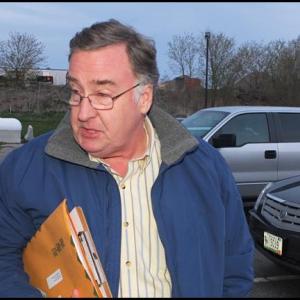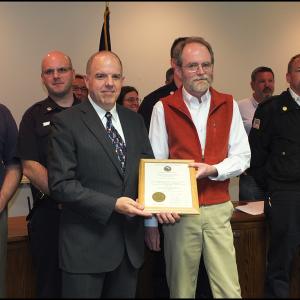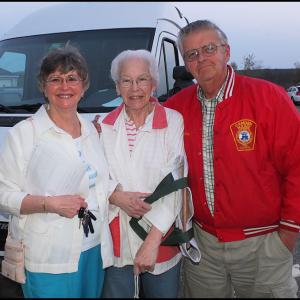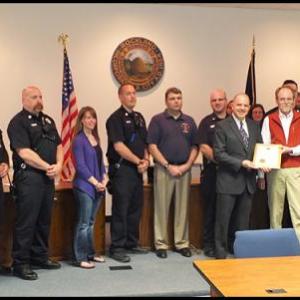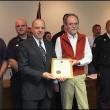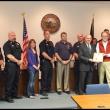In historic move, Rockland tells Lobster Festival to pay city fees
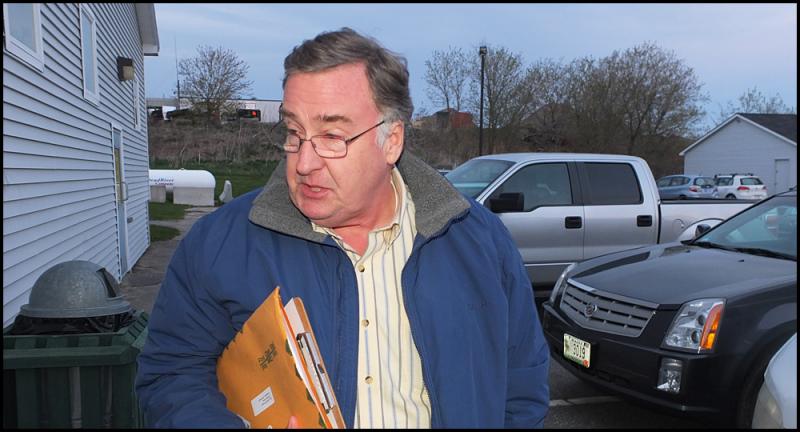 Chuck Kruger, president of the Rockland Festival Corporation, was outside City Hall following Monday night's vote by the Rockland City Council not to waive fees for the Lobster Festival this year. He expressed dismay and disappointment. (Photo by Chris Wolf)
Chuck Kruger, president of the Rockland Festival Corporation, was outside City Hall following Monday night's vote by the Rockland City Council not to waive fees for the Lobster Festival this year. He expressed dismay and disappointment. (Photo by Chris Wolf)
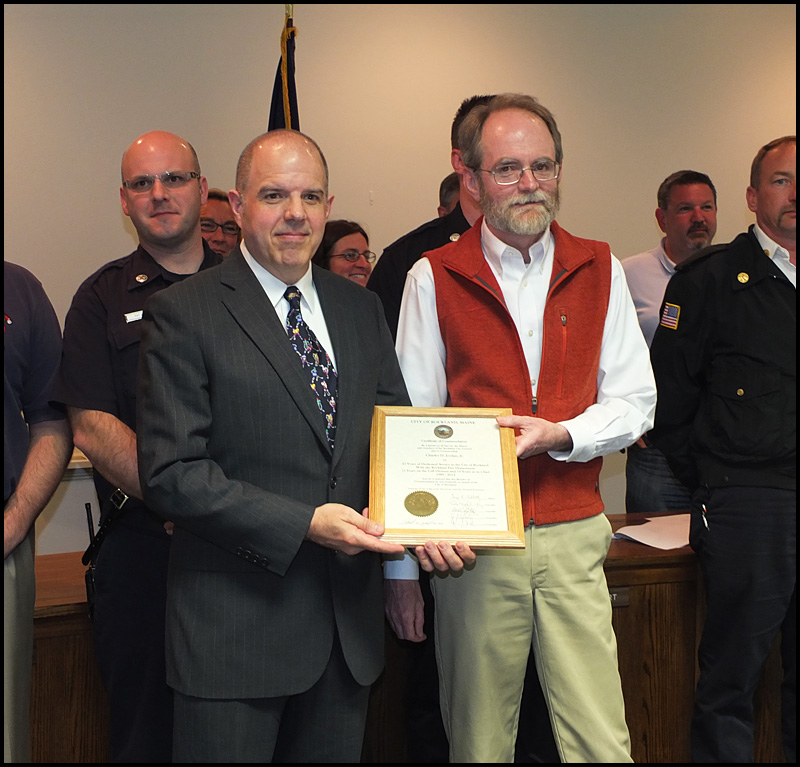 Retired Chief Charles Jordan Jr, with Mayor Larry Pritchett.
Retired Chief Charles Jordan Jr, with Mayor Larry Pritchett.
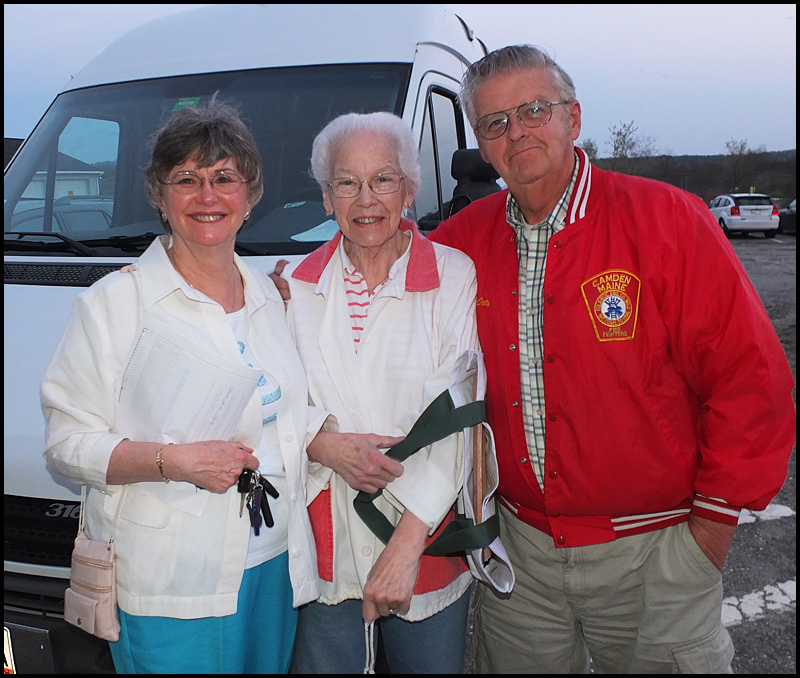 Left to right: Sharon Lombardo 28 years as a festival volunteer, Alice Cree-Knight, who has more than 40 years as a festival volunteer, and Bob Oxton, 25 years as a festival volunteer.
Left to right: Sharon Lombardo 28 years as a festival volunteer, Alice Cree-Knight, who has more than 40 years as a festival volunteer, and Bob Oxton, 25 years as a festival volunteer.
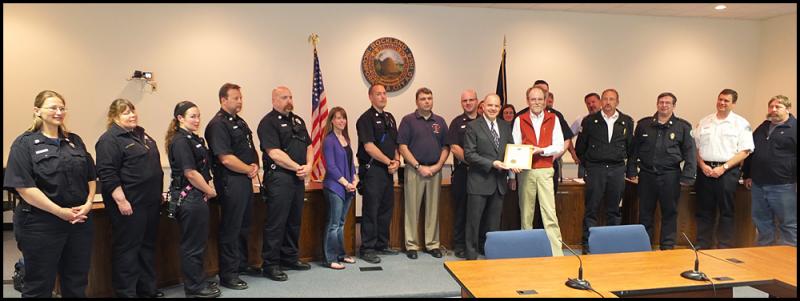 Chief Jordan with members of the City Council and members of Rockland's fire and EMS service.
Chief Jordan with members of the City Council and members of Rockland's fire and EMS service.
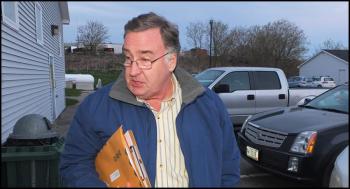 Chuck Kruger, president of the Rockland Festival Corporation, was outside City Hall following Monday night's vote by the Rockland City Council not to waive fees for the Lobster Festival this year. He expressed dismay and disappointment. (Photo by Chris Wolf)
Chuck Kruger, president of the Rockland Festival Corporation, was outside City Hall following Monday night's vote by the Rockland City Council not to waive fees for the Lobster Festival this year. He expressed dismay and disappointment. (Photo by Chris Wolf)
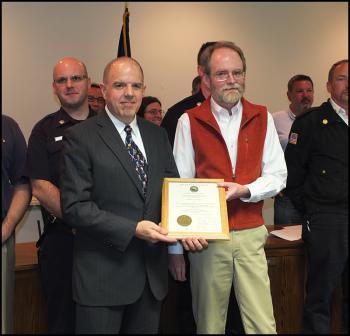 Retired Chief Charles Jordan Jr, with Mayor Larry Pritchett.
Retired Chief Charles Jordan Jr, with Mayor Larry Pritchett.
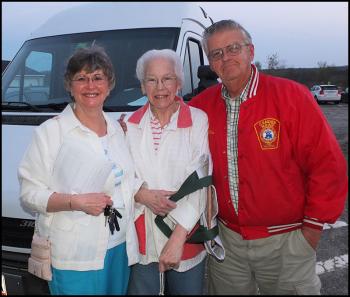 Left to right: Sharon Lombardo 28 years as a festival volunteer, Alice Cree-Knight, who has more than 40 years as a festival volunteer, and Bob Oxton, 25 years as a festival volunteer.
Left to right: Sharon Lombardo 28 years as a festival volunteer, Alice Cree-Knight, who has more than 40 years as a festival volunteer, and Bob Oxton, 25 years as a festival volunteer.
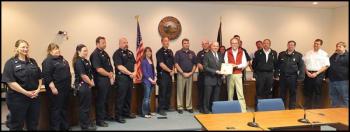 Chief Jordan with members of the City Council and members of Rockland's fire and EMS service.
Chief Jordan with members of the City Council and members of Rockland's fire and EMS service.
ROCKLAND — Voting 4 to 1, the Rockland City Council declined to waive fees for the Rockland Festival Corporation’s use of Harbor and Mildred Merrill Parks for the 2014 Maine Lobster Festival. The fees, now due to the city, amount to $14,250 for the seven days of use. This will be the first year in the festival’s 66 year history that a fee has been charged.
Festival Corporation officials pleaded their case to commissioners by citing the numerous donations to the city the festival has made over the years. Chuck Kruger, of Thomaston, and who is president of the Rockland Festival Corporation, said he was sensitive to the challenges the council has in running a festival at the lowest possible cost to taxpayers.
“I’m not opposed to the Lobster Festival paying fees to the city for the use of its public space as other major events do,” said Kruger.
He then asked that the council recognize the difference between for-profit events and the events like the Lobster Festival, which, he said, pour proceeds back into the region.
“Revenues are down and costs are up,” said Kruger. “We depend on more than 1,000 volunteers to make the festival happen. If they went away, so would the Lobster Festival. We cause millions of dollars to be spent in this community. It could go away. That’s not a threat it’s a reality.”
Threat or reality, councilors responded as to why the festival should be charged.
Councilor Eric Hebert was the lone supporter in waiving the fees. He said the practice of waiving the fees that previous councils had established was in recognition of the Lobster Festival’s contributions to the community.
“The festival is a huge economic generator for this area,” said Hebert. “I see the waving of the park fees as being an investment of that economic engine.”
Councilor Elizabeth Dickerson said it would be simplest if the fee was paid and then the Festival Corporation not give $14,250 of donations.
“What really needs to happen is for Rockland to have determination over how it spends its own money rather then wait for someone to donate it,” said Dickerson. “It’s what’s fair and that is what would benefit our taxpayers the most. People don’t get to say I don’t want to pay my property taxes, but I’ll make a donation. They don’t get to do that, so I think what’s fair is to pay the fees that are assessed and then if they so choose to make further donations and if you don’t, then you don’t.”
Councilor Louise MacLellan-Ruf said she loves the Lobster Festival and the energy it brings, as do all the other festivals to the community. She called on her many years of serving on the Harbor Commission as the basis for her decision.
“I sat on the Harbor Commission for many years as a commissioner,” she began. “Every single year the commission would have a lengthy discussion about the Lobster Festival fees and should they be assessed, or shouldn’t they. Every single year it was brought to council that the Harbor Management Commission had said no, do not waive the fees.”
MacLellan-Ruf said she would need to support the harbor commission since she had served on it for so many years and felt it would be contrarian to say that now that they are feeling some emotional pressure to then respond to that emotional pressure and waive the fees because the council might come off in bad light.
“People may think that we are doing something that isn’t very nice,” said MacLellan-Ruf. “To have the festival pay their fees just takes care of the political quagmire that has come up around donations. It lets the city keep its word, in that it said they would not waive any fees. The festival is able to get their control back and get billed by the city. Then from there they can decide what they want to do philanthropically for Rockland.”
Councilor Frank Isganitis said the first issue for him was how to represent 7,300 residents and 3,800 property taxpayers in the community.
“I’m struggling to understand what’s the difference is in saying to you, for our fiscal security, as much as we love it coming in increments, we really need it annually in the amount of the fees,” said Isganitis. “No one has been able to answer that question for me.”
Isganitis said the city is a business. Paying the fee was essential in his mind to best serve the taxpayers of Rockland; since it was the number one concern of the taxpayers, it had to be in the fore front of every decision he made.
Following the vote, Lobster Festival representatives stood outside discussing the council’s decision.
Bob Oxton, of Camden, and who is a member of the Festival Corporation, said the decision would affect the amount of donations the festival makes to the city.
“It will affect it in a big way,” said Oxton. “I’ve been working 25 years for the festival and I will have a change of heart. It’s a different board they have a different outlook and they want dollars and this festival is not about dollars.”
Kruger said the $14,000 represents more then half of the festivals net proceeds.
“Every year we save enough money to put on next year’s festival and then we give all the rest of it away to worthy causes in the Midcoast, most of it in Rockland,” he said. “It’s a blow. It’s the forest for the trees. Here we are trying to operate functionally and the city isn’t helping. We may have to reevaluate our budget position; we’ve had some other revenue changes that we were expecting that didn’t materialize.”
Festival Corporation members said they did not believe the council’s decision would change admission fees or the price of a lobster dinner at the festival.
Recognizing Charles Jordan, Jr.
Retired Rockland Fire Chief Charles Jordan Jr. was honored for his 25 years of service to the city with a certificate and plaque. A special message from Senator Susan Collins was read by Mayor Larry Pritchett before the presentation thanking Jordan for his years of service.
“People associate the fire department with the ambulances, the ladder truck and pumper trucks, but in many conversations I’ve had with chiefJordanhe’s emphasized how much the fire department is really about fire prevention,” said Pritchett. “I think that one thing that has really changed under his leadership is the city’s attention to life saving codes and to doing our best to get property owners to comply with those.”
Pritchett said that the fact that fires don’t get started in the first place, the quality of equipment and personnel were all because of the leadership of Chief Jordan.
Event Date
Address
United States

